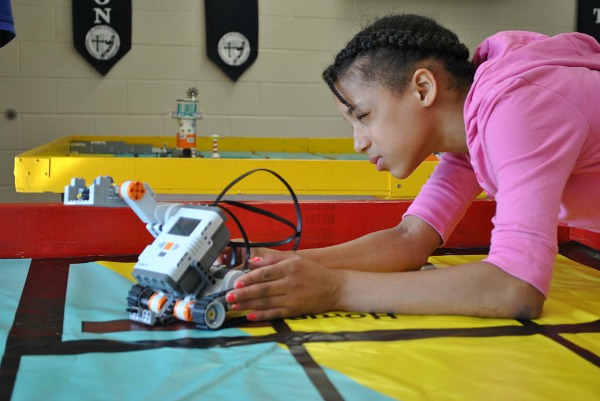Next Generation Science Standards Given C Grade by Education Think Tank

The National Science Teachers Association shot back at the Thomas B. Fordham Institute, an education research think tank, after the organization gave a lackluster grade to the newly developed Next Generation Science Standards. The standards, which were created to update science education nationwide, were given a “C” for their effectiveness as compared to other individual state science curriculum.
The Fordham Institute noted in their evaluation of NGSS that while the new standards did outweigh science education in 12 states, they either were too close to call or inferior to curriculum in 38 states and the District of Columbia.
NSTA Executive Director, Dr. David L. Evans, responded:
The NGSS contains rigorous and substantive science content that will give all students the skills and knowledge they need to be informed citizens, college ready, and prepared for careers in a workforce that now considers science skills and knowledge to be basic and fundamental requirements. We also applaud the NGSS writers for maintaining a teachable number of core ideas. If fully implemented, we believe the majority of students will leave high school with a far greater understanding and working knowledge of science than is currently being achieved.
The Next Generation Science Standards were established by a coalition of state policy leaders, educators, and organizations like NSTA as a way to streamline science education and create a comprehensive, cohesive curriculum that would prepare America’s students to be leaders in the STEM industry.
Proponents pointed to the U.S.’s international ranking in science and mathematics, the lack of patents filed by American companies, and the nation’s shrinking competitive advantage in technology as reasons to update and expand science curriculum.
The development group took a three-pronged approach -- practice, content and crosscutting -- to develop the framework for the standards and ensure all students become science proficient.
NGSS introduces engineering design -- answering a question through the use of design -- as a new method for students to discover a solution to a problem. The standards also focus on foundational models including cause and effect; scale, proportion, and quantity; and energy and matter to help students understand how different forms of science are interconnected.
NGSS will also provide broad-based content that is grouped into four categories to be taught at all levels K-12. The content is also made current with the inclusion of STEM-based study. These categories include physical sciences; life sciences; earth and space sciences; and engineering, technology, and applications of science.
NGSS has support among several leading corporations, including Microsoft, IBM Intel, Cisco Systems, and Chevron.
In the same vein as the Common Core State Standard Initiative and College and Career Ready programs, the creators of NGSS hope that, while voluntary, the program will be accepted by all states in an effort to update what has been deemed dated science curriculum and make the U.S. competitive in the STEM arena.
However, not all states are ready to change another part of their state education. While 26 states signed up as “lead states” to assist in the development of NGSS, only three state boards of education have adopted the standards.
Rhode Island became the first state to unanimously approve the new standards back in May. Kentucky followed not long after with a majority vote, though it must go through a lengthy legislative process before final approval. Kansas is the most recent state to adopt the standards, despite fierce criticism from opponents over how NGSS promotes and treats the topics of evolution and climate change.
These issues, as well as concerns about the push for tech and engineering components over traditional science concepts, could make it difficult for NGSS to find sweeping support nationwide.




